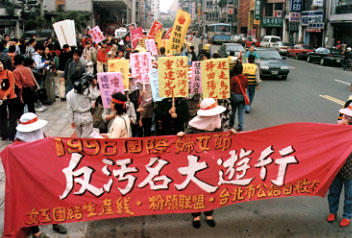Taiwan
This year, the Taiwan Solidarity Front of Women Workers held a special anti-stigma campaign to commemorate IWD. They hope that the whole society can cease to stigmatize women for being women, and instead, treat women as full and equal members of the family and of society. Women are not second-class citizens, and on this special day, they stood in unity to claim and affirm their equality. Many sectors of the Taiwanese women's' movement joined the anti-stigma campaign:Women factory workers are protesting the stigmatization that they face for being women workers, which often makes them ashamed to tell others their occupation. In addition, they are protesting discrimination from employers and the state, which means that women's' wages are still much lower than men' wages. Women in some sectors still risk formal or informal dismissal if they marry and/or become pregnant -- a clear case of institutionalized stigmatization that men do not face.
 Outside a licensed sexhouse on March 7, ready for the anti-stigma rally, licensed sex workers were masked, reflecting the pressure of social stigma against them.
Outside a licensed sexhouse on March 7, ready for the anti-stigma rally, licensed sex workers were masked, reflecting the pressure of social stigma against them.
Woman migrant workers and domestic helpers are protesting the stigmatization they face as migrants and as women. They want to reaffirm the value of their work (in spite of being poorly paid) and the positive aspects of their identity, in spite of the social stigma.
Lesbians and gays are also joining in solidarity against social stigmatization. Just because of their sexual orientation, society discriminates against them and makes it dangerous for them to tell others their identity.
Sex workers want everyone to support them in the campaign against
They registered for this work because of great economic need that social welfare cannot provide for: in order to support their children, younger brothers and sisters, parents or disabled family members, or in order to pay off family debts. In spite of their economic hardship, they are treated as social outcasts. They have been engaged in a long struggle for a two-year decriminalization transition period in order to find other jobs. But whenever they appear in public, most don't dare to remove hats and masks for fear of social stigmatization.
Taipei sex workers beseech women everywhere not to shun them and stigmatize them, but to show solidarity with them in their struggle for economic survival.
All these women and friends of women who protest took part in a rally on March 7, 1998 to commemorate International Women's' Day.